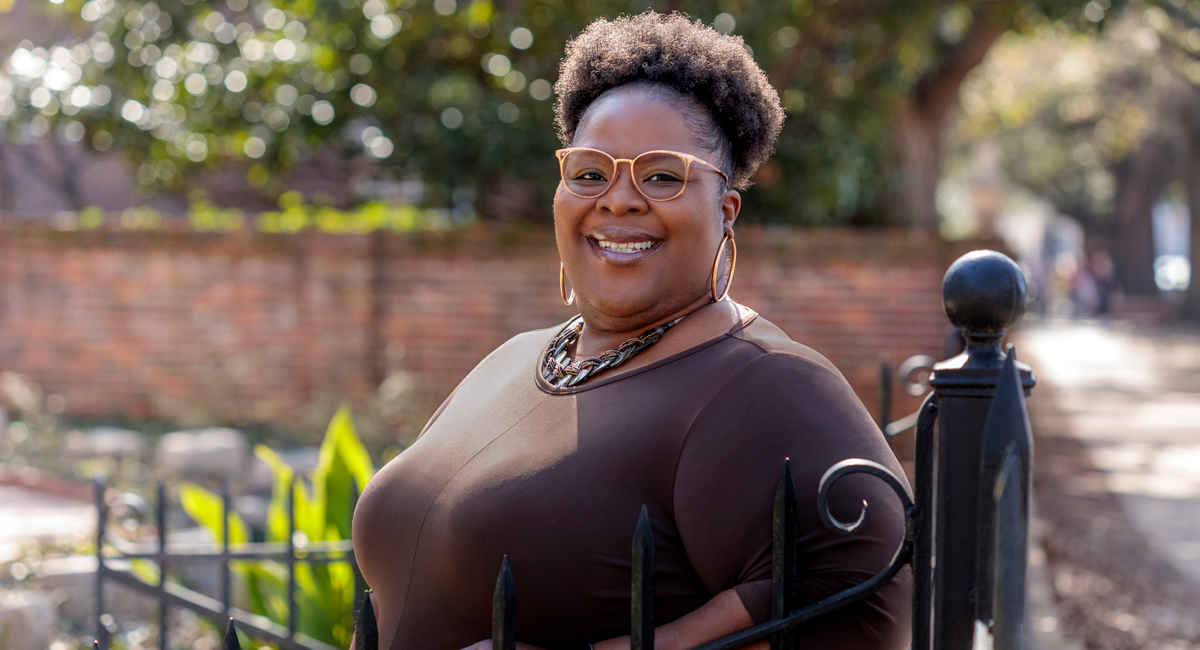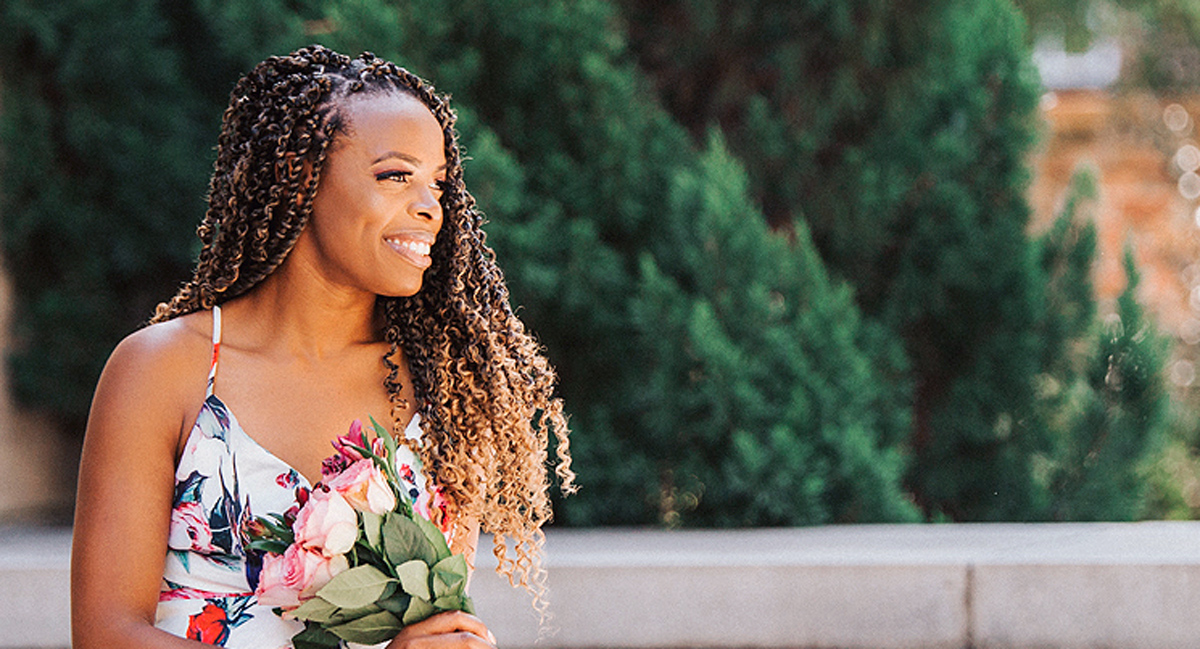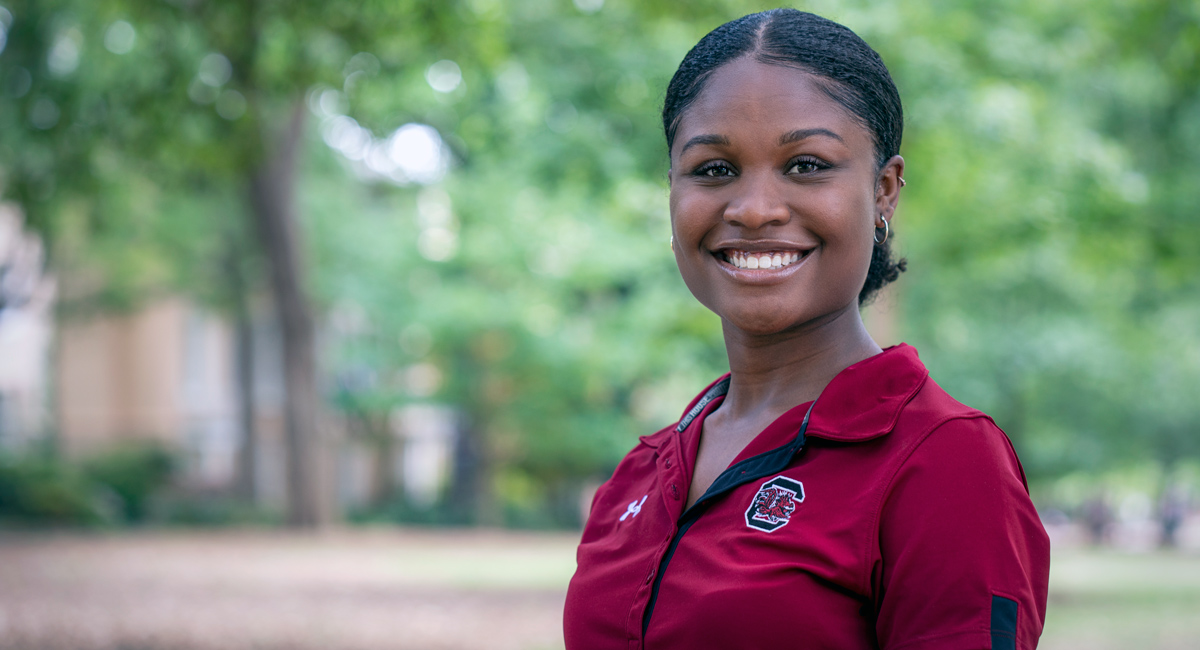50 years of inspiration
African American Studies program builds community, shapes students
Posted on: February 23, 2022; Updated on: February 23, 2022
By Megan Sexton, msexton@mailbox.sc.edu, 803-777-1421
Much has changed in the world since the University of South Carolina established the African American Studies program in 1971. What hasn’t changed is the program’s commitment to shine a light on the Black experience.
Created as an interdisciplinary program to broaden the university’s teachings to include the social, political, cultural and historical experiences of African Americans, AFAM Studies continues to inspire students who take classes in everything from history to literature to social sciences.
“African American Studies is dedicated to the study of Black life and culture, but it’s clear to anyone who has had the opportunity to work with our professors over the last 50 years that coursework is only the starting point. AFAM Studies is also about building community and providing an intellectual space for meaningful growth, action and accountability on campus and beyond. We’re honored by the commitment that UofSC has made to AFAM Studies since 1971,” English professor and program director Qiana Whitted says.
We talked with three women who have taken African American Studies courses to learn more about how their experiences in the classroom shaped their lives.

Salandra Bowman, SC ETV chief learning officer, Ph.D.
Salandra Bowman arrived at the University of South Carolina from the small town of Greenwood, expecting to major in French and perhaps become a teacher. But her life took a sharp turn in the spring of her freshman year, when her adviser suggested she take a class in African American Studies.
“After taking that course, I never left. I just dug deeper and deeper into the content,” she says. “The coursework addressed a lot of the questions that I had in high school. It gave me opportunities to learn more about African American thinkers and intellectual traditions and read the literature that I was craving. In my honors English and AP English courses in high school, I would always ask, ‘When are we going to read something by black folks?’”
Soon, she was immersed in courses that introduced her to writer Toni Morrison, slave narratives, W.E.B. Du Bois and the Harlem Renaissance.
“The literary contributions and traditions, along with the history and politics, it all was really instrumental in my own personal development and getting clear about what I know, how I come to know it and what my values are,” she says.
As a first-generation college student, Bowman admits she had some concerns about majoring in African American Studies, fearing it could limit her career choices. She graduated in 2005 with a degree in English and a minor in AFAM Studies. But she wasn’t finished with the subject.
After a short stint working for the Social Security Administration, she was lured back to higher education, this time for a bachelor’s degree in AFAM Studies. Then it was time for graduate school. She left South Carolina to earn her master’s from Ohio State University and later started her Ph.D. in Black Studies at Michigan State, but decided to come back home where she would “begin to use my master's and undergraduate degrees in public service to the state, and then later enroll in a doctoral program (at UofSC) in education, foundations and inquiry.”
She worked for the TRIO programs at the university, taught as an adjunct instructor in AFAM Studies and worked for the state’s Technical College System.
“Those positions were instrumental in really helping me get clear about how I would use my African American Studies training in the workforce. One of the things I say is that we must always make room for diversity of thought, always considering the counter-narrative or those voices that are unspoken, making sure that the work that we do resonates with the community that we are working with.”
At ETV, where she directed training and research and now has joined the executive ranks as the chief learning officer, she uses her degree every day as she works to make society more accessible and integrate the voices of historically underrepresented groups. She also earned her doctorate from the College of Education in December.
In the classroom at UofSC, she says shares her story with students.
“To my students, I try to be transparent about my career pathway and some of the challenges that I've encountered, but I really try to assure them that you can be and do whatever you want to do with a degree in African American Studies. I'm proof of it. I have worked in youth engagement programs. I've worked in technical education. I am now working in state government and communications. I teach in higher education, and I am civically engaged in my community. The degree gives you the capacity to understand who you are as a human being and what your responsibility and contribution is to sustain the world.”
At the university, she was the beneficiary of excellent teaching and mentorship in the AFAM Studies program.
“I was a student in one of Dr. (Qiana) Whitted’s first classes. Her Toni Morrison class changed my life. I love me some Jesus, but Toni Morrison is gospel for me. Dr. (Bobby) Donaldson is amazing; he invited us to really think about our responsibility to understand history so that we can counter some of the narratives that are out there. In Dr. (Cleveland) Sellers’ courses, we were singing freedom songs. He would send us on these hunts and give us a date, asking ‘What is the significance of this date?’
“And all of that, it’s never left me. All of that has informed me as a scholar, as a practitioner, as a member of my community and a member of my family. You cannot go through that type of program and not be changed. You cannot.”

Dr. Amartha Gore, obstetrician and gynecologist
A path from microbiology to African American Studies to medical school to practicing as an obstetrician and gynecologist in Kansas may seem unorthodox, but for Dr. Amartha Gore the route has made perfect sense.
Gore grew up in the Spring Valley neighborhood of Columbia. After graduating from Heathwood Hall, she headed to the University of Miami as a microbiology and immunology major, with a desire to practice medicine and attend a college away from her hometown.
It was at Miami where a course in African American Studies introduced her to topics like systemic racism and broadened her understanding of Black issues and culture.
“As an African-American student you experience a lot of these things,” Gore says. “To actually have a college professor talk about these things, engage us all in our own experiences and talk about how these things are happening in the media, through social constructs, and in books and education, it was very interesting.
“I felt seen. I felt heard.”
Her professor at Miami talked to her about her interests and encouraged her to consider changing her undergraduate major to African American Studies.
“I thought that was really crazy at the time. Why would I want to do that if I'm going toward the sciences? And she actually blew my mind with the thought process. She said you can pursue whatever you want to pursue when it comes to professional careers. If anything, (majoring in AFAM Studies) will give you a better understanding of the populations you are probably going to be dealing with and it will shape the way you practice.”
When she decided to leave Miami and transfer to UofSC her sophomore year, she took that advice. At South Carolina, she quickly connected with history professor Valinda Littlefield, who would soon be named the AFAM Studies program director. Gore found classes that offered her a chance to expand her knowledge and understanding of the African American experience.
“Probably most importantly, the program provided a family dynamic that I would have never experienced if I had chosen the sciences. No shade to the sciences, but there was just a level of ‘We want to really make sure that you succeed.’ Dr. Littlefield would seek me out personally for different opportunities that the AFAM department was highlighting — not just to boost up my resume, but to really increase my understanding of what this field can do and how we can take it wherever we go,” Gore says. “I love that family there. That was one of the best decisions I ever made.”
After completing medical school at the Medical University of South Carolina in Charleston and her residency with the Allegheny Health Network Consortium in Pittsburgh, Gore came home to South Carolina to practice in Lancaster. She recently moved to Kansas with her husband, who is in the Army and stationed at Fort Riley.
Because a military career means multiple relocations, Gore has chosen to work as a locum tenens physician. Similar to a traveling nurse, a locum tenens physician fills in while another clinician is unavailable, rather than work in a permanent practice. In Kansas, she will be working a few hours from Fort Riley at a hospital in need of an OB-GYN.
“It’s great because I tell them, ‘For the next six months, this is when I can work.’ And then I'm free to go and pursue other things. So whenever the Army says, “Hey, you’ve got to pick up and move,’ I'm ready to go.”
It also exposes her to patients in great need — a community she has known she wanted to serve since her days as an AFAM Studies major at South Carolina.
“Typically, it's not the bigger cities that require help. It's usually the rural or smaller cities, honestly, where a lot of physicians and professionals are not really interested in going,” she says. “But those are still communities of people that need providers and that need access to health care.

Hannah White, senior, South Carolina Honors College
Senior Hannah White has an impressive resume: Member of the South Carolina Honors College, Student Government vice president, marketing and management double-major in the Darla Moore School of Business, university ambassador, podcast host.
And the latest addition to that list: Documentary filmmaker.
Her film, completed as her Honors College senior thesis, tells the story of the contributions and impact of African American women on the University of South Carolina campus since 1963. She interviewed more than 20 women, starting with the first Black woman to attend the university since Reconstruction, Henrie Monteith Treadwell.
The spark for developing the project was ignited through the African American Studies program.
White, a Greenville native who will graduate in May with a minor in African American Studies, took her first AFAM course during her freshman year, examining the civil rights movement with history professor Val Littlefield.
“And it was absolutely amazing, and it made me want to learn more, not just about African American history in the U.S., but specifically within South Carolina and at the university,” she says. That led to an Honors College course in which she worked on a semester-long project to develop an African American history tour of campus, a topic particularly relevant to White since she worked as a university ambassador, giving tours to potential students.
She hosted a 12-hour podcast during the pandemic where she talked with notable Black alumni to raise money for the One Creed, One Carolina campaign, which benefited programs that support Black members of the university community.
“That was probably one of my favorite things that I've gotten to participate in at the university. My favorite part was listening to their stories and hearing how they all have USC connections to each other, and they went on to do amazing things in their respective fields. It was interesting to hear about their experiences on campus,” White says. “That's what motivated me to do my honors thesis, which I'm working on closely with the AFAM department.”
The AFAM department helped her do roundtables with faculty members to learn about Black women on campus, assisted her in finding different grants, checked in on her progress and watched edits of film. The funding provided by the AFAM Studies department allowed her to bring along two of her closest friends, alumni Kendric Lindsey and Lyric Swinton, to help the documentary come to fruition.
The nearly two-hour documentary focuses on student movements, mentorship, student life, struggles and legacy. White calls it “a celebratory film,” and it will premiere in March as part of AFAM Studies’ 50th anniversary celebration.
“There are many things about this documentary that other people could get out of watching it. But one of the biggest things that I hope is that it will help Black women who are considering going to the university. They can watch this and relate and see that this is a place for them,” she says. “Even Black students who decided to go here, but still are not 100 percent sure, they can see they have a community that they can connect to. They can watch this film and be inspired.”
The process of interviewing and learning about her predecessors at the university has also been inspiring to White.
“I learned to have so much gratitude for the place that I come from. For students, if you're ambitious and you really want to just have an impact on other people's lives or be successful, you think you have to check these certain boxes. So you hear people go to Harvard or put this title with their name in order to be worthy of doing something great. And I think this documentary demolishes that mindset,” she says. “I never, ever have been more proud to be a part of the University of South Carolina, specifically because of these Black women who have paved the way for me, spoke up, used their voice and made sure it was heard. And they have gone on to different things, breaking barriers in industries. It taught me that we made a bigger impact than I could ever imagine.”